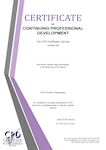Financial Management and Budgeting Corporate Package- CPD Accredited
CPD Corporate Package for 5 participants |Free online assessment |Free online course |Tutor led workshop
HB Publications and Training International
Summary
- Certificate of completion - Free
- Tutor is available to students
Add to basket or enquire
Overview
Financial Management and Budgeting - For the Public and Non Profit Sector
Help achieve budget objectives and deliver value for money services with this great Financial Management and Budgeting package!
The Financial Management and Budgeting training package offers 5 participants the opportunity to become skillful, pro-active and confident in all areas of financial management and budgeting.
The Financial Management and Budgeting package includes:
- access to our excellent online course providing flexible learning
- access to an online assessment to track progress
- a virtual half day workshop on MS Teams
- 12 CPD points for each participant with certificate
Financial Management and Budgeting, is delivered by expert experienced Chartered Accountants:
We have worked with hundreds of organisations and trained many thousands of managers and staff in the public and non profit sectors.
Our clients include local and police authorities, health and housing organisations, schools and academies, and many more.
Financial Management and Budgeting for the Public and Non Profit Sectors, is an ideal investment for organisations aiming to achieve budget targets and deliver value for money services.
Certificates
Certificate of completion
Digital certificate - Included
CPD
Course media
Description
Financial Management and Budgeting
Financial Management and Budgeting Course Objectives
- improve your financial management competence
- understand financial accounts
- gain underpinning knowledge of financial management
- use financial information in the workplace.
- learn to prepare, monitor and manage budgets
- become more effective in your current or future job roles
- achieve value for money for your organisation
- develop essential skills for career progression
Financial Management and Budgeting Course Content
Financial Overview
- Keeping Financial Records
- Financial Transactions
- Accuracy and Completeness
- Financial Terminology
Budget Setting
- Definition of a Budget
- Budget Setting Process
- Budget Setting Techniques
- Budget setting assumptions
- Demand led budgets
- Profiling Budgets
- Forecasting Income
- Key to Successful Budgeting
Financial Management
- Principles of Budget Monitoring
- Steps in the Monitoring Process
- Establishing Actual Income and Expenditure
- Commitment Accounting
- Variance Analysis
- Calculating Variances
- Reasons for Variances
- What to do about Variances
- Projecting Outturns
- Monthly Monitoring Routines
Budgetary Control
- Budget Control Drivers
- Uncontrollable Variances
- Taking Action to Control Budgets
- Budget Virement
- Budgetary Control reports
- Budgetary Control v Cost Control
- Responsibility for Budget Management
Previous participants of Financial Management and Budgeting have said:
“The course helped me to have a better understanding of budgeting principles and financial management. I also feel more confident to ask questions about management accounts, particularly as I have been equipped with improved skills to analyse and look beyond the figures in the reports. The course was delivered at a good pace and I liked the fact that we looked at the published accounts from my own company which really helped put the learning principles in to practice and therefore improved my understanding.” Head of Case Management, Solicitors Disciplinary Tribunal
“I enjoyed the course and it was very helpful. I have been able to bring back a number of recommendations from the course and improve our budget monitoring, helping to make our programme more transparent and offer greater value for money for the tax payer.” Compliance Executive, Skills Development Scotland
"The course was excellent and pitched at the right level to reflect my public sector role and experience. There was ample space for dialogue and discussion and it enabled me to develop clear actions to take forward. I would strongly recommend the course to any managers who want to understand how to take a more proactive approach to budget setting and management in senior public sector contexts." Transportation Services Group Manager, East Riding of Yorkshire Council
"I enjoyed the course on Friday and it has really motivated me to ask to be more involved with the budget setting so that I can further understand our own budget. The course was really informative." Senior Finance Officer, Hertswood Academy
This course will include:
- Illustrations/Case Studies/Practice Exercises
- Trainer-led PowerPoint presentations
Time: 10.00am to 1.00pm
OR
By arrangement.
Who is this course for?
Financial Management and Budgeting is recommended for
All organisations within the public sector, such as local government, education, health, environmental services, social services, and emergency services etc. who wish to gain an understanding of financial management.
Organisations in the non profit sector, including NGOs, Voluntary Organisations, Charities, and the Arts
Staff and managers with budgetary responsibility
Requirements
There is no prior knowledge required for this Financial Management and Budgeting course.
Financial Management and Budgeting is suitable for all levels of financial competency - beginner to experienced.
Career path
All staff attending this Financial Management and Budgeting course will gain valuable CPD points
Financial Management and Budgeting will also assist staff with career progression and enhance their CV.
Questions and answers
Reviews
Currently there are no reviews for this course. Be the first to leave a review.
Legal information
This course is advertised on reed.co.uk by the Course Provider, whose terms and conditions apply. Purchases are made directly from the Course Provider, and as such, content and materials are supplied by the Course Provider directly. Reed is acting as agent and not reseller in relation to this course. Reed's only responsibility is to facilitate your payment for the course. It is your responsibility to review and agree to the Course Provider's terms and conditions and satisfy yourself as to the suitability of the course you intend to purchase. Reed will not have any responsibility for the content of the course and/or associated materials.


